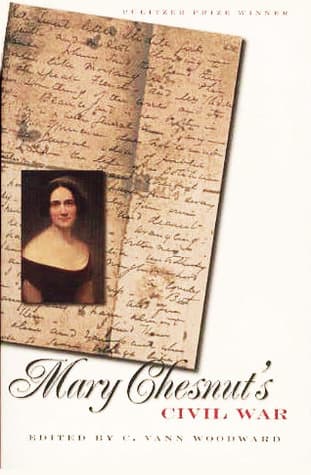
Book Review Summary: Mary Chesnut's Civil War
Introduction
Mary Chesnut's Civil War is a historical account of the American Civil War, written by Mary Boykin Chesnut, a Southern aristocrat and diarist. The book provides a unique perspective on the war, focusing on the disintegration and final destruction of the Confederacy. Chesnut's diaries, edited by C. Vann Woodward, won the Pulitzer Prize for History in 1982. This article will analyze the views and opinions of readers regarding Mary Chesnut's Civil War.
About Mary Boykin Chesnut
Mary Boykin Miller Chesnut was born in 1823 and grew up in South Carolina. She married James Chesnut Jr., a prominent lawyer and former U.S. Senator who later became a General in the Confederate States Army. Chesnut was well-educated and fluent in several languages, including French and German. She kept detailed diaries throughout her life, which she revised and expanded over time. Her writings offer insights into the social and political landscape of the South during the Civil War era.
Analysis of Views
-
Honesty and Authenticity: Many readers praise Mary Chesnut for her honesty and authenticity in expressing her thoughts and experiences during the Civil War. She is seen as a privileged slaveowner who was able to be honest about her feelings, even when they conflicted with her beliefs. This authenticity adds depth to her account and makes it more relatable to readers.
-
Social Perspective: Chesnut's diaries provide a unique social perspective on the Civil War. She describes the lives of the wealthy Southern aristocracy, their social gatherings, and their interactions with those in positions of power. Readers appreciate this insight into the lives of people who were not directly involved in the battles but still felt the impact of the war.
-
War's Impact on Society: Chesnut's diaries also offer a glimpse into how the war impacted society, particularly the lives of women and children. She writes about the hardships faced by those left behind during the conflict, including food shortages, loss of property, and the emotional toll on families. These personal accounts add a human element to the broader historical narrative.
-
Fascinating Writing Style: Mary Chesnut's writing style is often described as fascinating, with its literary allusions, French phrases, and literary references. While some readers find this style challenging due to the stilted prose of the era, others appreciate its authenticity and enjoy rereading passages to fully grasp the author's intent.
-
Research and Editing: C. Vann Woodward's research and editing of Mary Chesnut's diaries are also highly praised by readers. He provides extensive footnotes and annotations to contextualize the events and people mentioned in the diaries. This thorough research adds credibility to the book and enhances its overall value as a historical resource.
Reasons for Recommendation
-
Unique Perspective: Mary Chesnut's Civil War offers a unique perspective on the Civil War, focusing on the lives of Southern aristocrats and their experiences during the conflict. This perspective adds depth to our understanding of the war's impact on society and provides insights into the thoughts and feelings of those who were not directly involved in combat.
-
Honesty and Authenticity: Mary Chesnut's honesty and authenticity in expressing her thoughts and experiences make her account relatable and engaging for readers. Her willingness to confront uncomfortable truths adds depth to her narrative and makes her a compelling figure in Civil War history.
-
Insight into Social History: Chesnut's diaries offer valuable insights into social history, particularly in regards to gender roles, class distinctions, and social customs during the Civil War era. Readers appreciate these insights and find them enlightening in understanding the broader context of the war.
Reasons for Not Recommendation
-
Challenging Writing Style: Some readers find Mary Chesnut's writing style challenging due to its stilted prose and literary allusions. This can make it difficult to fully engage with the book, particularly for those who prefer more straightforward historical narratives.
-
Limited Focus on Military Strategy: While Mary Chesnut's diaries provide valuable insights into social history, some readers feel that they lack a deeper focus on military strategy and tactics during the Civil War. They may prefer books that delve more deeply into the military aspects of the conflict.
Conclusion
Mary Chesnut's Civil War offers a unique perspective on the American Civil War through the eyes of a Southern aristocrat. Mary Boykin Chesnut's honesty, authenticity, and insightful writing style make her account a valuable addition to our understanding of this tumultuous period in American history. While some readers find her writing style challenging, others appreciate her ability to convey the impact of the war on society and offer a fresh perspective on the conflict. Overall, Mary Chesnut's Civil War is recommended for those interested in social history, gender roles, and personal accounts of the Civil War era.